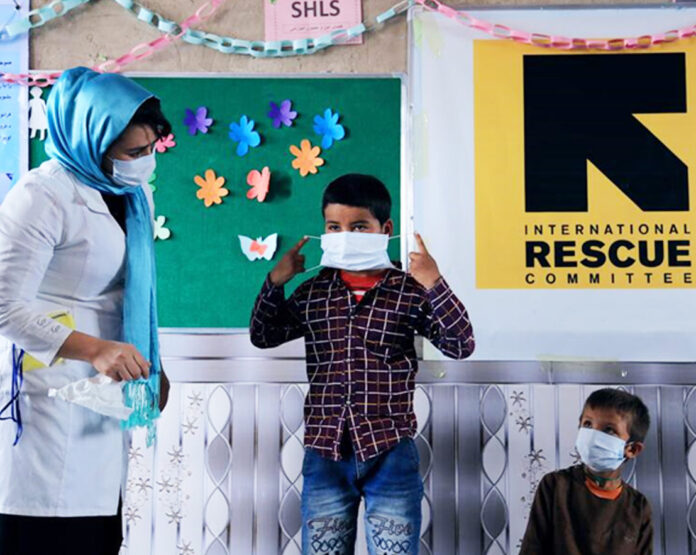With the withdrawal of American troops in Afghanistan and the quick takeover of Kabul by the Taliban, President Joe Biden said on Aug. 22 that the joint effort had evacuated nearly 33,000 people since July and pledged that evacuated Afghan allies that helped American troops would be given a home in the U.S. after they are screened and vetted. So far, 13 countries have agreed to at least temporarily host at-risk Afghans. According to the Biden administration there are still up to 15,000 Americans and 50,000 to 60,000 Afghan allies who still need evacuation, leaving the administration with the possible extension of its original Aug. 31 deadline. The UN Refugee Agency reports that 80% of a quarter of a million Afghans forced to flee since the end of May are women and children, and that the current crisis in Afghanistan is adding more, with more than five million Afghans displaced in the country and across borders. San Diego County reports Afghanistan makes up the second most refugee arrivals behind Haiti.
As a resettlement agency, this is where the International Rescue Committee San Diego focuses its work. In 2020, the IRC served 7,425 individuals from 118 countries including 175 new refugee arrivals. IRC San Diego has two offices, one in City Heights and another in El Cajon.
IRC San Diego Executive Director Donna Duvin said its primary mission is helping refugees, asylum seekers, immigrants, and other low-income or marginalized communities, with much of its work supporting newcomers and integrating them into the community.
“We are best known in El Cajon in the area of refugee resettlement. That also includes our support, not only of refugees coming in from Afghanistan, but also our support of those arriving under special immigrant visas,” said Duvin. “We have been serving Afghan clients that have been coming into the area for quite some time, which is one of the reasons (we) placed the office in El Cajon. We realized at some point that the East County area was claimed to be one of the better environments where new arrivals could really find adequate housing and supported by a very robust community, and partners that are able to support newcomer families.”
Duvin said most families are assigned to IRC by the U.S. State Department, and its staff immediately goes to work setting up housing ahead of their arrival, meeting them at the airport or bus station when they come through Los Angeles.
“We immediately start working with the family to get them settled in their new apartment, as well as working with the family to get them going with school enrollments, making sure they are connected with health care providers,” she said. “Many are traveling from long distances and long periods of time and have not had the opportunity to refresh their medications or attend to any medical concerns that they might have. We go to work with the adults in the household to help prepare them for employment and help them be placed in unemployment to help them as well with the idea that any of our incomer families working towards self-sufficiency with the support of the IRC initially and increasingly becoming independent of the IRC over time.”
Duvin said what is playing out on the news and the current circumstance in Afghanistan is extremely painful for many people to watch.
“We have a lot of people in the community who are very concerned about the state of people that might be in harm’s way,” she said. “Whether it is staff working onboard with the IRC, we do have a number of people from Afghanistan who are on our staff, to those who are already arriving, our hearts are going out to these people in these circumstances. We are hopeful that our U.S. State Department and government will continue to work mightily to get those people out who dedicated their own allegiance in supporting our U.S. operations in Afghanistan. IRC is here to assist and support those families that deserve to have that safety and protection, and a warm welcome to coming to a new community after going through so much.”
Duvin said at the beginning of its fiscal year in October, it projects the number of refugees and special immigrants. This year, based on history, circumstances, the world condition, and what the State Department is approving, IRC can support about 100 individuals coming in under the Special Immigrant Visa Program, as well as 195 individuals resettling as refugees.
“We have the capacity to serve the individuals coming to us and we do not expect to exceed those numbers that we are expecting to be seeing, although we cannot say that for certain because we may have people arriving on their own volition and seeking assistance,” she said. “But the good news is that we believe there is good capacity in our communities to support the numbers that may be coming to us, and that also includes our community partners that also work with families upon their arrivals. Our school districts are prepared for the numbers that may be arriving, our public safety folks are aware that they have newcomers coming in that will potentially need their support and need to be acclimated to a new community. We also work closely with employers to let them know that we have individuals coming in from a certain nationality, as well as working with our property managers to alert them to the need that are likely to be coming our way.”
Duvin said what is unusual this year is that typically, that number of individuals spans over the year, but that now they might be seeing them coming in at a fast pace in the next months.
“The pace of those arrivals just means that the pace of our staff is working around the clock to make sure that the support is in place and that we are gearing up to meet those individuals at a rapid clip, so that we are able to help those families as they arrive,” she said. “As this is an emergency nature where evacuation is critical, it changes the amount of time of being notified and receiving the clients coming our way. Typically, we would have a two week turnaround time and be able to get their apartment set up and furnished when they first arrived. If we do not have that time for turnaround planning, and if we cannot find that available apartment space, then it means we lean into temporary housing solutions until we secure the longer term apartment living arrangements.”
Duvin said some of the determining factors on which families come to this region. Refugees are determined by the State Department working with resettlement agencies across the country. She said the first thing the IRC considers is if the family has U.S. ties in a particular community or location. She said if family has preceded them, there is an established community, it is more successful for that family in their overall integration. She said special immigrant visa holders have more license to determinate where they will call home.
Duvin said it receives per capita funds from the State Department, as well as a little more support from the federal government that covers the costs of the administrative staff that work to resettle individuals. She said that funding goes only so far, so the IRC relies on contributions from the community to help augment that funding to ensure families get the entire support needed as they integrate into the community.
IRC’s Open Homes is a collaboration with Airbnb that allows private citizens to donate a home or open room to temporarily house newcomers.
“It allows them to know that the clients placed with them have been vetted and the hosts have been vetted. We want to make sure that it is safe for both parties, even if it is a temporary solution,” she said.
To donate IRC locally, visit www.help.rescue.org/donate/us-san-diego-ca. For more information about services at IRC visit www.rescue.org/united-states/san-diego-ca.













